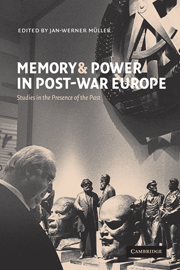Book contents
- Frontmatter
- Contents
- List of contributors
- Acknowledgements
- Introduction: the power of memory, the memory of power and the power over memory
- Part 1 Myth, memory and analogy in foreign policy
- Part 2 Memory and power in domestic affairs
- 7 The past is another country: myth and memory in post-war Europe
- 8 The emergence and legacies of divided memory: Germany and the Holocaust after 1945
- 9 Unimagined communities: the power of memory and the conflict in the former Yugoslavia
- 10 Translating memories of war and co-belligerency into politics: the Italian post-war experience
- 11 Institutionalising the past: shifting memories of nationhood in German education and immigration legislation
- 12 Trials, purges and history lessons: treating a difficult past in post-communist Europe
- Index
7 - The past is another country: myth and memory in post-war Europe
Published online by Cambridge University Press: 22 September 2009
- Frontmatter
- Contents
- List of contributors
- Acknowledgements
- Introduction: the power of memory, the memory of power and the power over memory
- Part 1 Myth, memory and analogy in foreign policy
- Part 2 Memory and power in domestic affairs
- 7 The past is another country: myth and memory in post-war Europe
- 8 The emergence and legacies of divided memory: Germany and the Holocaust after 1945
- 9 Unimagined communities: the power of memory and the conflict in the former Yugoslavia
- 10 Translating memories of war and co-belligerency into politics: the Italian post-war experience
- 11 Institutionalising the past: shifting memories of nationhood in German education and immigration legislation
- 12 Trials, purges and history lessons: treating a difficult past in post-communist Europe
- Index
Summary
Fifty years after the catastrophe, Europe understands itself more than ever as a common project, yet it is far from achieving a comprehensive analysis of the years immediately following the Second World War. The memory of the period is incomplete and provincial, if it is not entirely lost in repression or nostalgia.
Hans-Magnus EnzensbergerFrom the end of the Second World War until the revolutions of 1989, the frontiers of Europe and with them the forms of identity associated with the term ‘European’ were shaped by two dominant concerns: the pattern of division drafted at Yalta and frozen into place during the Cold War, and the desire, common to both sides of the divide, to forget the recent past and forge a new continent. In the West this took the form of a movement for trans-national unification tied to the reconstruction and modernisation of the west European economy; in the East an analogous unity, similarly obsessed with productivity, was imposed in the name of a shared interest in social revolution. Both sides of the divide had good reason to put behind them the experience of war and occupation, and a future-oriented vocabulary of social harmony and material improvement emerged to occupy a public space hitherto filled with older, divisive and more provincial claims and resentments.
- Type
- Chapter
- Information
- Memory and Power in Post-War EuropeStudies in the Presence of the Past, pp. 157 - 183Publisher: Cambridge University PressPrint publication year: 2002
- 33
- Cited by

